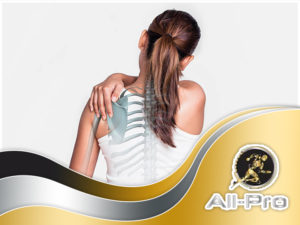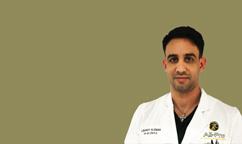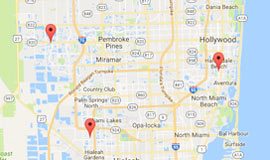Don’t get discouraged by a dislocated shoulder. Get treatment in Florida.
The shoulder is one of your most mobile joints. Since your shoulder is naturally unstable, it is one of the most frequently dislocated joints in the body.
Fact: One out of every five dislocations occurs in the shoulder.
It is common to experience shoulder dislocations, so learn more about how they occur and how they can be treated in Florida.
Don’t give up on fun activities just yet. Consider getting dislocated shoulder treatment in our different Florida locations.
What is a Dislocated Shoulder?
A dislocated shoulder occurs when your upper arm pops out of your shoulder socket, which is one of the easiest joints to dislocate due to its shallow socket. To push or pull your bones out of place, you must exert a lot of force or use extreme rotation.
Contact sports most often cause a dislocated shoulder joint, like football, or sports with a high fall risk, like gymnastics or skateboarding. You can also dislocate your shoulder due to a fall or injury unrelated to sports.
Learn More Here: How To Better Treat Shoulder and Knee Pain
Classifying Shoulder Injuries
Identifying your injury can be the first step toward healing. Doctors classify shoulder dislocations into three groups:
-
Traumatic dislocation – This dislocation has caused a strong, traumatic force to pull the shoulder out of the joint, resulting in a serious injury that generally requires rehabilitation and surgery.
- Atraumatic dislocation – Everyday activities can cause the shoulder to dislocate without much force. Repetitive pressure gradually loosens the shoulder joint and causes instability. This injury can repeatedly occur to someone with loose ligaments (“double joints”) without causing pain or damage.
- Positional non-traumatic dislocations – People with unusual shoulder muscles can easily pull their shoulders out of joint painlessly and without discomfort. If the issue becomes painful or problematic, physical therapy or surgery may be used to correct it.
You are more likely to suffer a shoulder dislocation if your shoulder joint is unstable, and vice versa.
What is a dislocated shoulder treatment?
Doctors from our Florida clinics will assess and examine your condition. A doctor usually orders an X-ray to determine whether you have broken bones or dislocated your shoulder. Dislocated shoulder treatment may involve different techniques, depending on the severity of your condition: closed reduction, immobilization, medication, rehabilitation, or surgery.
In general, shoulder dislocations should be treated conservatively and strengthened with guided rehabilitation if they occur for the first time. It may require resting the joint, applying ice to reduce swelling and pain, using a sling to immobilize the joint, taking pain medication, and eventually, undergoing physical therapy.
The initial dislocated shoulder treatment involves reducing the dislocation. This usually requires treatment in the emergency room. It usually involves painkillers and sedative medicine to help you relax and ease the pain. The doctor will rotate your arm until it returns to its socket. After restoring your shoulder joint, you will have another X-ray to ensure it is in the correct position.
How would I know if I need dislocated shoulder treatment?
Symptoms associated with a dislocated shoulder may vary, depending on the causes and gravity. Regardless, you should seek immediate help and dislocated shoulder treatment:
- Intense shoulder pain, especially in the joint
- Deformity or the shoulder is visibly out of place
- Inability to move the shoulder or shoulder weakness
- Numbness and tingling
Common Causes Why You Need Dislocated Shoulder Treatment
Most shoulder dislocations occur in sports-related accidents or while playing contact sports like rugby.
-
Sports Injury – Shoulder dislocations occur most commonly in sports and athletic activities, particularly those requiring repeated shoulder use. In addition, any impact that includes a twisting motion increases the likelihood of a resulting shoulder dislocation.
The most common sports that often result in a dislocated shoulder include football, hockey, rock climbing, soccer, volleyball, and gymnastics.
- Impact Injury – Trauma to the shoulder is another common cause of a dislocated shoulder. Some of these injuries can come from car accidents, hard impacts to the shoulder, and violent seizures or shocks that result in bodily injuries.
- Falls – In older people, the cause of a dislocated shoulder is often falling onto outstretched hands. People who try to break a fall by throwing out their hands usually result in having a dislocated shoulder. Any fall (falling off a ladder or tripping, etc.) and falling onto hard surfaces such as a concrete or wooden floor may cause a dislocation.
- Loose Ligaments – People with loose joints (joint hypermobility) are more likely to experience shoulder dislocations. Repetitive overhead motions often cause looseness. Many jobs also require repetitive overhead movements. Repetitive or stressful activities can challenge a weak shoulder, resulting in pain and instability. Looser ligaments can make it harder to maintain shoulder stability.
Will I ever be able to return to sports after a shoulder dislocation?
 Injured athletes often wonder when they can return to the sports they love to play. Once your initial pain subsides, rushing back into the game is tempting.
Injured athletes often wonder when they can return to the sports they love to play. Once your initial pain subsides, rushing back into the game is tempting.
After a shoulder dislocation, most athletes can return to sports once their joint has healed. You should seek your doctor’s approval before returning to play too soon to prevent further dislocations or complications.
Orthopedic specialists from our Florida locations understand your unique case and can create a timeline that keeps you playing longer.
Get Dislocated Shoulder Treatment in Florida.
Dislocated shoulders are very common, especially in athletes. Get the treatment you need with personalized dislocated shoulder treatment from our specialists in Florida.
All-Pro Orthopedics & Sports Medicine is one of the top provider for dislocated shoulder treatments in Pembroke Pines, FL. We don’t just treat athletes; we also treat patients with non-sports-related injuries. We specialize in orthopedic surgery, treatment of musculoskeletal issues, and sports injuries.
Call us at(954) 322-1110 to know more about our procedures and other services.











